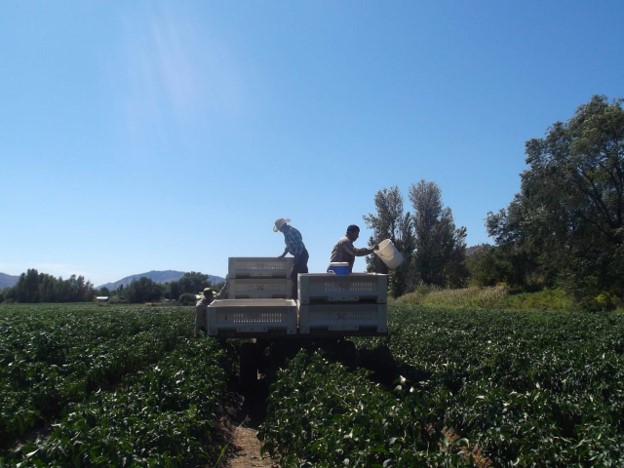The “Forgotten” Essentials: Mexican and Central American Farmworkers during the Covid19 pandemic
By Violeta Gutiérrez Zamora

Mexican laborers harvesting chillies in British Columbia, Canada, 2019. Photo: Mariana Elizabeth Gutiérrez Zamora
Governments around the world have ordered everyone to stay home amidst the COVID-19 pandemic except the workers deemed as essential to keep running our societies. Farm laborers are among them. Many of the now recognized as essential workers, however, receive low-wages and are hired under precarious conditions. Farmworkers, employed as pickers and packers in the industrial food and agricultural sector, are often from the most marginalized sectors of the society in which they work. For instance, it is well-known that for decades in the USA and Canada, immigrants from Mexico and Central America bear the brunt of farm labor. A few weeks ago, after years of derogatory comments about Mexican and Central American immigrants, the USA federal government had recognized immigrant farm workers’ critical role in feeding the country. However, such recognition did not mean concessions for their working conditions.
The stories of Mexican and Central American farm laborers and their migration to the USA and Canada cannot be detached from? the conditions of poverty, insecurity, unemployment and exploitation in their own countries. In the last decades, the expansion of the large corporate agribusiness model in Mexico and Central America and the commodities boom inaugurated by the NAFTA agreement and followed by CAFTA promised to alleviate the high rates of poverty and support agricultural producers in rural areas. However, rural monetary poverty and financial insecurity have persisted, despite its reduction between 1990 and 2014. According to the FAO and CEPAL reports published in 2018, the percentage of rural population living in poverty was 77% in Guatemala, 82% in Honduras, 65% in Nicaragua, 49% in El Salvador, and 45% in Mexico.
Until now, the Central American and Mexican rural populations are not among the most affected by COVID-19. But their governments have already categorized farm laborers as indispensable to avoid crops rot and food shortages. They ‘will not stay at home’ and can continue working. The worry among farm laborers is that the agricultural enterprises will leave the most vulnerable groups without financial support (including those with chronic diseases, +65 years old and pregnant women). Already, in San Quintín Baja California (one of the most affected states in Mexico), farmworkers union representatives are urging that enterprises take measures to avoid COVID-19 transmission among workers in the farms.
The provision of food to the people in the cities, like Mexico City, Guatemala, San Salvador, and Tegucigalpa but also of Los Angeles, New York, Vancouver, and Montreal, heavily depends on the forgotten but essential Mexican and Central American farm laborers. However, their future working and living conditions seem unpromising. The harsh conditions in which farm laborers work are not necessarily improving: minimum wages, lack of access to health security, insufficient sanitation infrastructure, and high exposure to pesticides and other chemicals.
The several crises produced by COVID-19 may create another layer of vulnerability for farmworkers in economic, environmental, and health terms. However, this pandemic and its socio-ecological impacts may also raise more profound questions on the ecological and human costs of industrial food production and the supply chain that feed global populations. Hopefully, it also nurtures the expansion of more ethical and sustainable food production systems, in which farmworkers from all Latin America have better working conditions.
Bio: Violeta Gutiérrez Zamora is an environmental policy researcher and Ph.D. candidate at the Department of Geographical and Historical Studies of the University of Eastern Finland. In her research, she focuses on feminist political ecology, eco-governmentality, rural organizations and community forestry in Mexico.